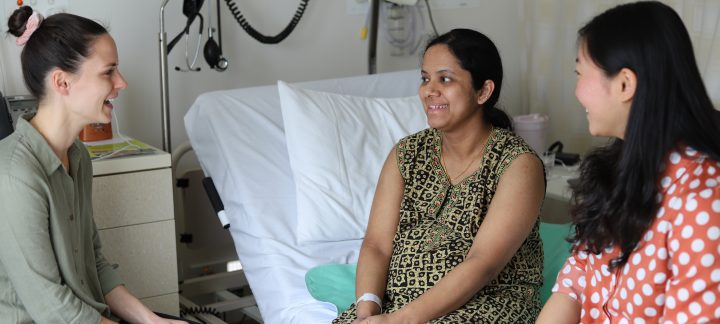The objective of Choosing Wisely is to implement projects to reduce unnecessary tests, treatments and procedures for both inpatients and outpatients to help drive improvements in patient care. The Choosing Wisely initiative encourages health professionals and patients, family members and carers to question the necessity of their tests, treatments and procedures where evidence shows they provide no benefit or, in some cases, lead to harm.
Improving our care
Staff identified that women who had a caesarean section (C-section) were being tested in the Post-Operative Recovery Unit (PACU) immediately after their C-section with a blood test that measures the amount of haemoglobin in the blood called a HemoCue. The test is done at the bedside and requires a small finger-prick volume of blood, similar to blood sugar measurement. The reason for the test is to determine haemoglobin levels, which can be low after surgery if there has been significant bleeding during the procedure. Low levels of haemoglobin can lead to a number of complications and a longer recovery.
As most women do not have significant bleeding during a C-section, it was likely that our practice of testing every single woman was unnecessary, both from a patient experience and cost perspective. Research also shows that the bedside test is not the most accurate test available. There are two other tests, in which blood is sent to a laboratory, that are more accurate but take longer to get a result and are considerably more expensive. In practice, if clinicians are concerned about the patient’s condition, they will order one of these two tests.
With this in mind, Mercy Health staff set out to develop an evidence-based approach to create a protocol to guide the selection of the most accurate, cost-effective and efficient test.
Over a two-week period, data collected from 108 patients confirmed how many of each of the three tests were performed before changing anything. This lead to the development of a new protocol which completely omitted doing the HemoCue (bedside) test. Instead, the protocol indicates which of the other two tests should be done based on the amount of loss during the C-section and the perceived urgency for a result.
The protocol was introduced following an intensive education campaign. A further audit of our practice four months later, on another 112 patients resulted in the following findings:
- There was 88 per cent compliance with the new protocol.
- Only five HemoCue tests were performed across the 112 patients.
- Of 47 patients who would have been given a HemoCue before the new protocol was introduced, only one had to have one under the new protocol.
- When projected over a full year with over 3,000 C-sections, the new protocol will result in a substantial reduction in unnecessary blood samples from patients and significant cost savings.
Learn more about Choosing Wisely and NPS MedicineWise



